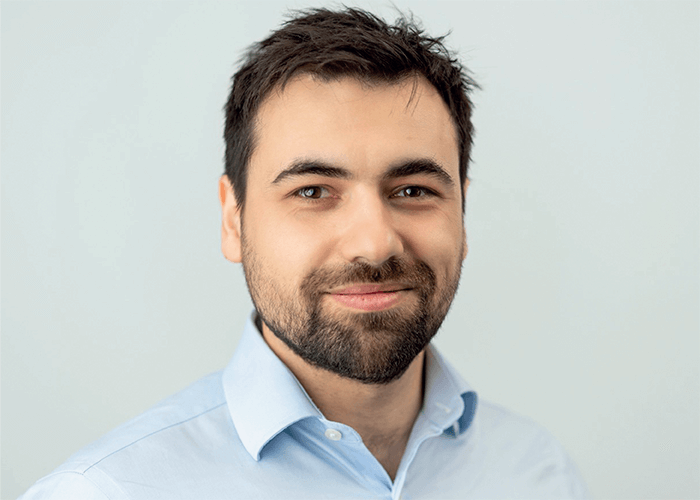What is the single biggest challenge facing your field in 2022 – and beyond?
Ultimately, I think the biggest challenge we face is the public perception of science, which should lead, one hopes, to public support of science. Despite having come through a global pandemic on the back of biomedical science, the public perception of science seems more strained than ever. We might feel a little removed from the public but, as the field develops and we translate instrumentation and techniques out of our labs into the clinic or the home, we will inevitably face negative public attitudes and perceptions. Many issues feed into this problem, but soaring education costs and existing public prejudices are key factors. Remediation will take collective action; as scientists, we need to think about how our roles extend beyond academia and what responsibility we have, or are willing to have, in the foundational aspects of science education and the public perception of science. Does this mean more or different approaches to outreach? Does this require a scientific body more engaged with policy, actively calling on our governments to accelerate investment in science and science teaching? I’m not sure.

Do you have any predictions for your field over the next five to 10 years?
We need cutting-edge, yet cost-effective technology to decentralize and democratize healthcare. I want to build a legacy that, through thriving and innovative research, can help everyone lead longer, healthier, and richer lives free from the specter of disease. Analytical and measurement science will be central to developing the necessary solutions. Yet our analytical chemistry labs are often removed from the clinic or the patient; we innovate in a vacuum. Unless we change our approach, we will ultimately fail to make a wider impact on society.
As a field, our approach tends to be an “engineering” one – a technical focus in which we often approach development removed from the actual problem we’re trying to solve. I think the field will become ever more multidisciplinary in its approach and hopefully see the value in human factors and human-centered design. Our starting focus must be the users, whether they are consumers or patients. The technology must fit around that, not the other way around. Of course, this shouldn’t be confused with questioning the obvious validity of blue-sky research, but we must face the greater challenge of innovation led by the wider needs of public health. This requires a shift in our approach.
Do you have any strong opinions with which the rest of the field disagrees?
I’ll try not to get sucked into what the field seems to think is “portable.” Instead, I’ll say that I don’t necessarily think we need more STEM graduates; we need more STEM graduates who are scientifically literate and competent. Perhaps much of that is down to how we approach teaching; we may need to provide more exposure to critical thinking and developing rational, hypothesis-driven approaches to problems.
What are your biggest fears for analytical science?
The lack of recognition of analytical measurement sciences can be a problem. Again, we have to make that case to our funders, the public, and decision-makers. It should be easy; measurements are the bedrock of science and analytical science, including new instrumentation and techniques, has invariably been at the heart of our greatest scientific achievements. But if I were to be pessimistic, I’d say that analytical science often takes a back seat or is not mentioned outside its own circles.
What do you credit most for your success in the early part of your career?
Depends how early! I was lucky to do my PhD in a lab where we focused on something that hadn’t been done before – single-cell proteomics – and I suppose we had the freedom to make mistakes in breaking new ground. Common threads have been great mentors and curiosity. I remember, early on in my PhD, joining Andrew de Mello’s group meetings; I wasn’t his student, but was curious about microfluidics and wanted to learn everything about physics and chemistry at the microscale. Microfluidics quickly became central to my research. I once thanked Andrew for taking the time to read my thesis and told him he’d been even more thorough than some of my official supervisors. Judging by his shock, I don’t think he’d actually realized I wasn’t one of his students and that he’d inadvertently adopted me! My independent career has benefited hugely from entrepreneurship, through which I’ve learned how to deliver scientific innovation commercially and drive impact.
What advice do you have for those following in your footsteps?
Have curiosity and ambition for what might be achievable. You’ll be surprised at how prevalent and ingrained dogma is and how fresh eyes will bring about fresh (better!) approaches.
Do you have any personal missions for the next 10 years?
Helping to build analytical communities through my work with CAMS-UK and IUPAC. CAMS-UK is a community dedicated to fostering connections between industrial and academic scientists to deliver world-class training, research, and innovation. I co-chair the separation sciences group and we’re keen to build awareness. Only through a networked, team-based approach will we solve the grand challenges we face.
Who would you invite to your dream dinner party?
Stephen Fry and Bill Shatner for the anecdotes. George Carlin to liven it up. Arnold Schwarzenegger and Robin Williams, who’d turn up late with cigars. Richard Feynman (my Lectures on Physics need autographing), who’d kick off a jam with his bongos before it got late, tired, and quiet. And Max Boyce, who would turn up to tell us all a lovely story under the stars with his guitar.
Ali Salehi-Reyhani is a Lecturer in the Faculty of Medicine, Department of Surgery & Cancer, Imperial College London, UK, and was featured on the Top 40 Under 40 Power List 2022




